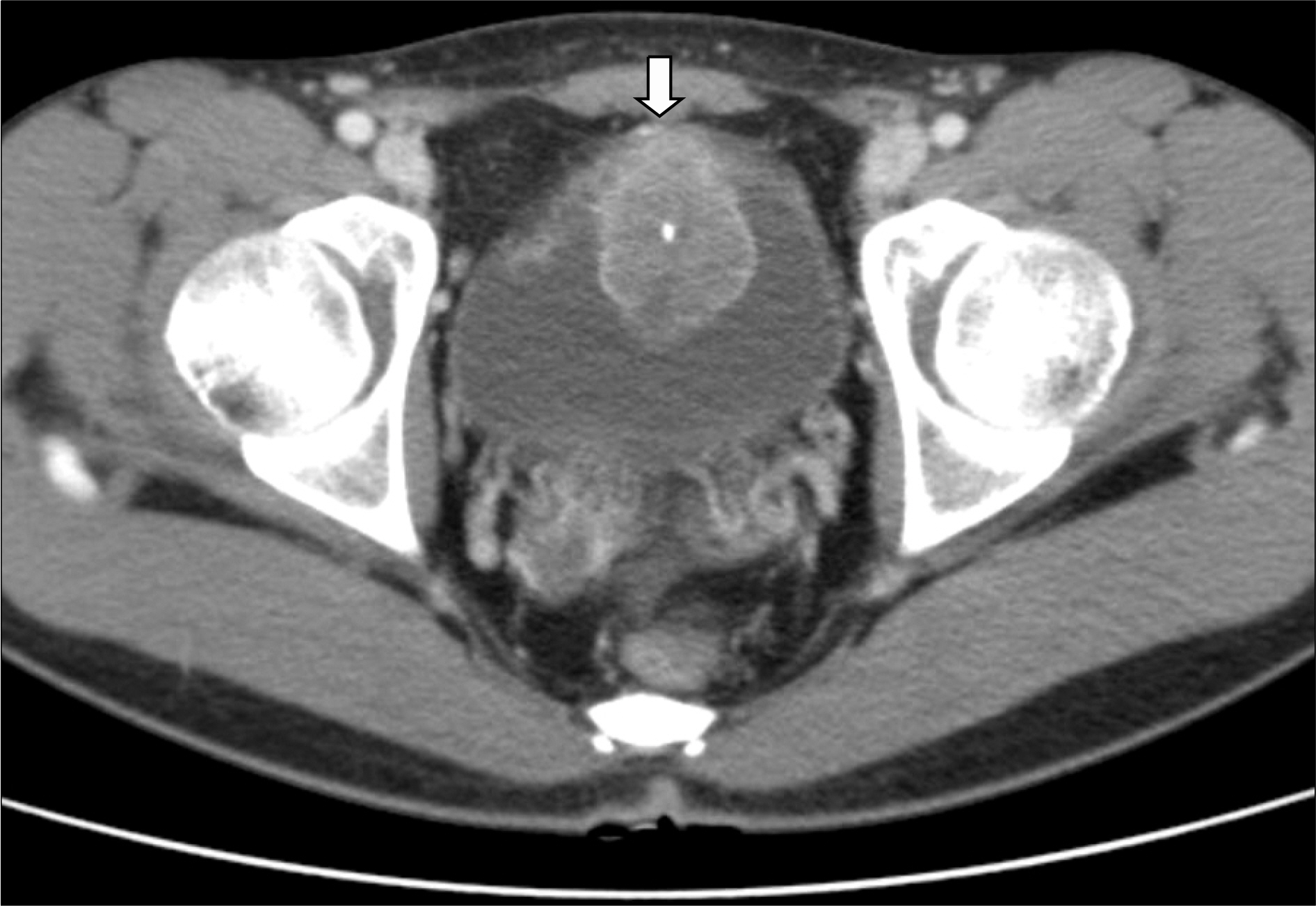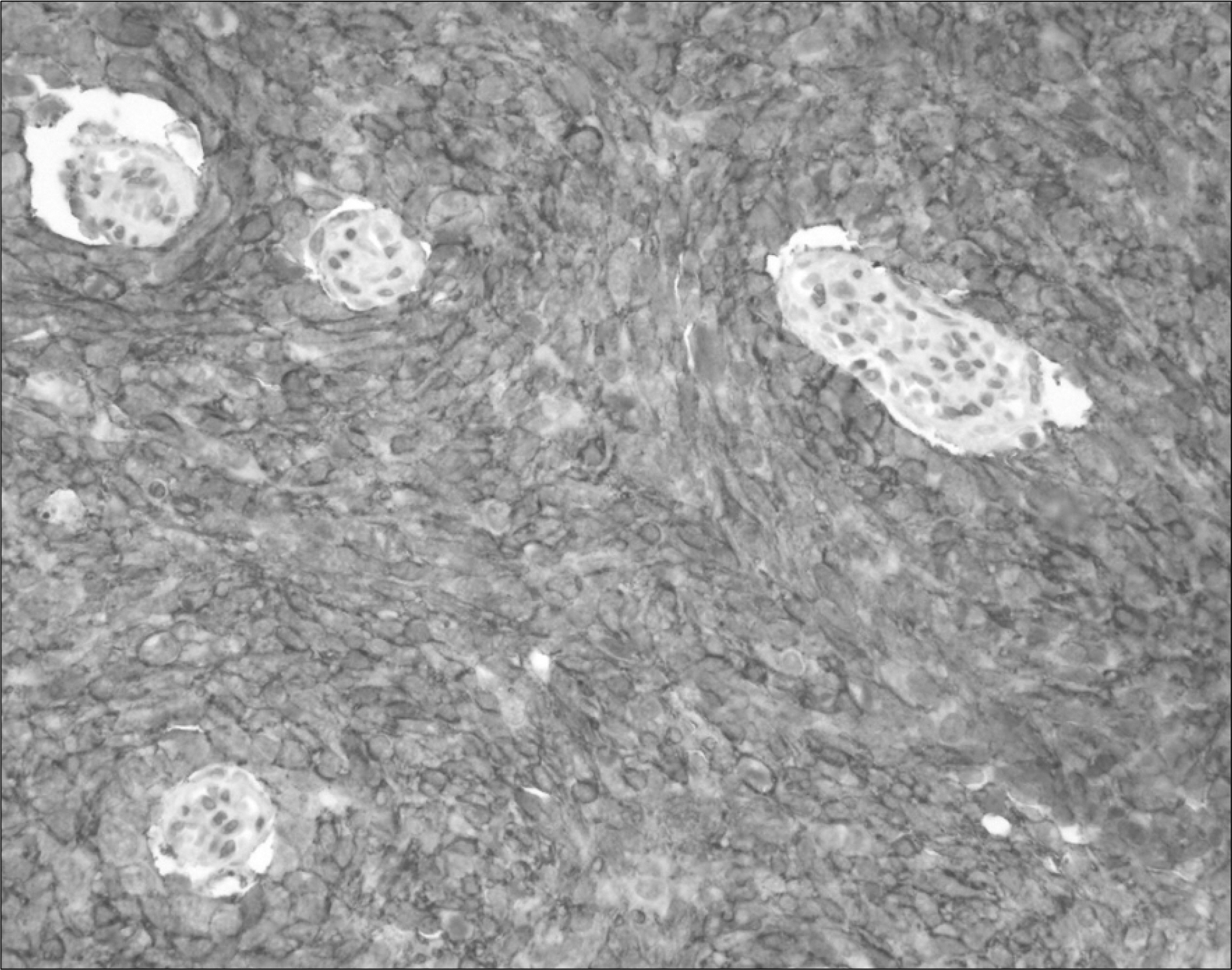Korean J Urol.
2008 Jul;49(7):647-649.
A Primary Large Cell Neuroendocrine Carcinoma of the Urinary Bladder in a 19-year-old Man
- Affiliations
-
- 1Departments of Urology, Chungbuk National University College of Medicine, Cheongju, Korea. wjkim@ chungbuk.ac.kr
- 2Departments of Pathology, Chungbuk National University College of Medicine, Cheongju, Korea.
Abstract
- Primary large cell neuroendocrine carcinomas of the urinary bladder are extremely rare. To date, only six cases of large cell neuroendocrine carcinoma have been reported. We present a case of a 19-year-old man who presented with gross hematuria and who was subsequently found to have a solitary tumor on the dome of the urinary bladder. The patient underwent transurethral resection of the bladder tumor for histological confirmation. A diagnosis of large cell neuroendocrine carcinoma was made based upon immunohistochemical reactivity for synaptophysin and CD56. Based on the pathologic diagnosis, he subsequently had a partial cystectomy. Histologically, the tumor penetrated the perivesical fat. It has now been 6 months since the surgery, and the patient is preparing to receive his 5th cycle of chemotherapy. There is no evidence of tumor recurrence or metastasis.
MeSH Terms
Figure
Reference
-
1.Klöppel G., Heitz PU., Capella C., Solcia E. Pathology and nomenclature of human gastrointestinal neuroendocrine (carcinoid) tumors and related lesions. World J Surg. 1996. 20:132–41.
Article2.Mackey JR., Au HJ., Hugh J., Venner P. Genitourinary small cell carcinoma: determination of clinical and therapeutic factors associated with survival. J Urol. 1998. 159:1624–9.
Article3.Abenoza P., Manivel C., Sibley RK. Adenocarcinoma with neuroendocrine differentiation of the urinary bladder. Clinicopathologic, immunohistochemical, and ultrastructural study. Arch Pathol Lab Med. 1986. 110:1062–6.
Article4.Hailemariam S., Gaspert A., Komminoth P., Tamboli P., Amin M. Primary, pure, large-cell neuroendocrine carcinoma of the urinary bladder. Mod Pathol. 1998. 11:1016–20.5.Evans AJ., Al-Maghrabi J., Tsihlias J., Lajoie G., Sweet JM., Chapman WB. Primary large cell neuroendocrine carcinoma of the urinary bladder. Arch Pathol Lab Med. 2002. 126:1229–32.
Article6.Dundr P., Pesl M., Povysil C., Vitkova I., Dvoracek J. Large cell neuroendocrine carcinoma of the urinary bladder with lymphoepithelioma-like features. Pathol Res Pract. 2003. 199:559–63.
Article7.Li Y., Outman JE., Mathur SC. Carcinosarcoma with a large cell neuroendocrine epithelial component: first report of an unusual biphasic tumour of the urinary bladder. J Clin Pathol. 2004. 57:318–20.
Article8.Lee KH., Ryu SB., Lee MC., Park CS., Juhng SW., Choi C. Primary large cell neuroendocrine carcinoma of the urinary bladder. Pathol Int. 2006. 56:688–93.
Article9.Blomjous CE., Vos W., De Voogt HJ., Van der Valk P., Meijer CJ. Small cell carcinoma of the urinary bladder. A clinicopathologic, morphometric, immunohistochemical, and ultrastructural study of 18 cases. Cancer. 1989. 64:1347–57.
Article10.Alijo Serrano F., Sanchez-Mora N., Angel Arranz J., Hernandez C., Alvarez-Fernandez E. Large cell and small cell neuroendocrine bladder carcinoma: immunohistochemical and outcome study in a single institution. Am J Clin Pathol. 2007. 128:733–9.
- Full Text Links
- Actions
-
Cited
- CITED
-
- Close
- Share
- Similar articles
-
- A Case of Primary Undifferentiated Small Cell Carcinoma of the Urinary Bladder
- A Case of Large Cell Neuroendocrine Carcinoma of the Parotid Gland
- Skin Metastasis of Neuroendocrine Carcinoma Arising in the Rectum
- Case Review of Small Cell Carcinoma of the Urinary Bladder in Korea
- A Young Man with Primary Small Cell Carcinoma of the Urinary Bladder




